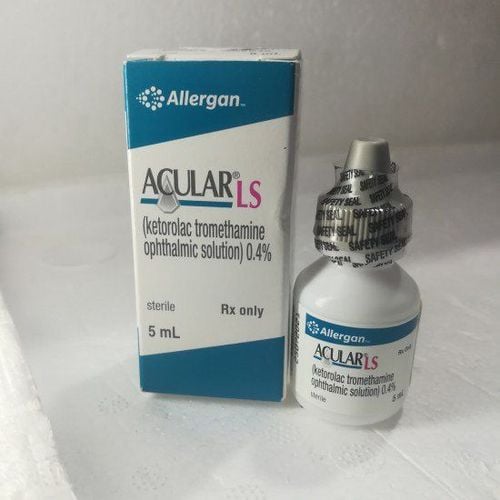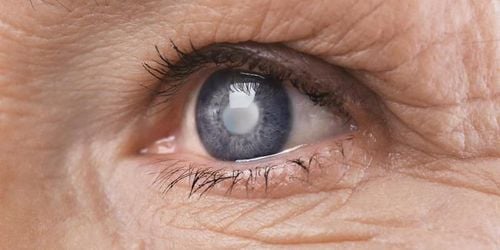This is an automatically translated article.
The article was written by Doctor, Associate Professor, Dr. Hoang Thi Minh Chau - Interdisciplinary Department - Vinmec Times City International General Hospital.Cataracts are the leading cause of blindness globally, mainly in the elderly. The most effective treatment for cataracts is still surgery. However, there are many patients who have surgery late, which easily leads to many complications.
1. What is called a cataract?
The vitreous is a transparent lens on the inside of the eye. The lens has the following important roles:
The lens has the ability to adjust to help the eye see objects at near and far distances. However, this ability is guaranteed as long as it is transparent, its thickness and curvatures are within physiological limits. The lens has the function of filtering ultraviolet rays - a type of harmful rays, found in the radiation spectrum of the sun. Cataracts are insoluble protein molecules that accumulate in the lens over time, making it less transparent. This condition is considered severe when it reduces vision to less than 3/10.
Cataract is a disease caused by the aging process of the body, so some people have it first, some people have it later. All people over the age of 50 are at risk for cataracts.
Depending on the type of cataract, the eye will blur slowly or quickly.
Cases of cataracts in the elderly nucleus: The patient's eyes only fade, when going out in the sun, there is no glare, even vision has not decreased much. However, when surgery, it was found that the lens was too old. However, these cases are also more difficult to convince to replace the lens, because the patient thinks that their eyes can still see, so they do not need surgery. In case of pathological or traumatic cataracts: The patient's eyes will fade very quickly and when going out in the sun, they will be blinded, very uncomfortable, unable to ride. Therefore, patients are easy to detect and often accept surgery earlier.
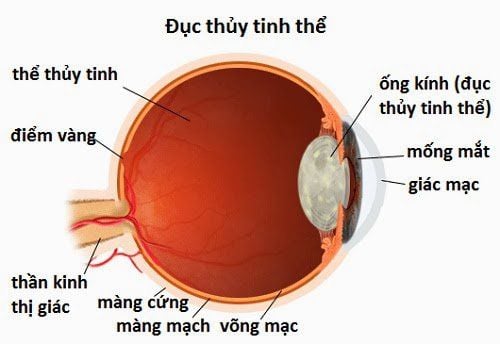
Hình ảnh đục thủy tinh thể
2. Complications of Cataracts
When you have cataracts, the vitreous becomes more and more opaque, until the lens is too mature, it will cause complications that can cause glaucoma and possibly rupture of the capsule. At that time, the protein of the lens becomes a foreign object to the body, which will be attacked by the body, causing an inflammatory reaction in the uvea.
In addition, during the process of overripe vitreous, it will absorb water and swell, causing loss of function, unable to regulate the fluid anymore, causing glaucoma (Glooma), then the patient has pain fierce head. This condition also affects the eye nerve, causing irreversible atrophy of the eye nerve. At this point, no matter how good the surgeon is, the ability to restore vision is still poor, even unable to see anymore.
When the cloudy lens is too hard, there will be inflammatory reactions in the eye, the pupil will stick, the eye will degenerate, the transparent environment will be completely opaque, making surgery more difficult and vulnerable to surrounding areas. around.
Therefore, patients with cataracts should have surgery as soon as possible to avoid complications. However, there are still many patients who think that when the eyes can no longer see the road, they will go for surgery. But in fact, if you decide to replace the lens to that extent, the surgery will be difficult and the prognosis is often worse. Because the rate of complications during surgery is higher than surgery at an earlier and more favorable time.
3. Treatment of cataracts
Cataracts are one of the leading causes of vision loss and blindness in the world. Until now, surgery is still the most effective way to cure cataracts. The method of PHACO (Phacoemulsification), i.e. using ultrasonic energy to pulverize and separate the cloudy lens into small pieces and then suck it out through a small incision that does not require stitches and is replaced with a nucleated lens. create another. This is a safe, effective and most advanced surgical method for cataract surgery today. Advantages of Phaco surgery:
The incision is very small, especially, with the most modern Centurion machine at Vinmec Times City, the incision is only 2.2 mm. The patient's vision recovered quickly. The surgery takes only 20-30 minutes. Patients can be discharged the same day. The complication rate of this method is low, almost no bleeding, little pain.
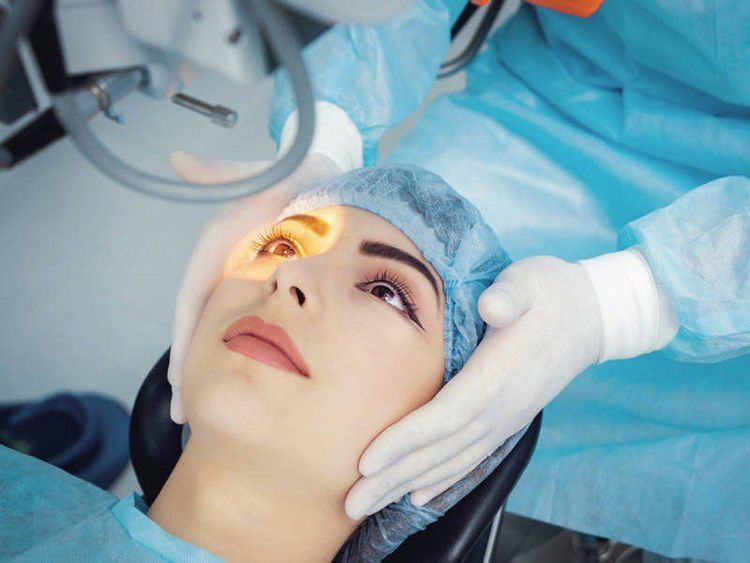
Phẫu thuật là cách điều trị bệnh đục thủy tinh thể hiệu quả nhất hiện nay.
4. After surgery, the patient will get the following results
Improve vision, the extent depends on the condition of the fundus and cornea as well as the previous diseases on the patient's eyes. Improve vision when moving and driving, as well as daily activities: reading, watching TV,... Depending on the type of monofocal or multifocal artificial lens, this vision will be different. When choosing an artificial lens before surgery, the doctor will advise this.
5. Unwanted effects that may occur during Phaco surgery:
Like other interventions, Phaco surgery can also have complications: Infection, bleeding,... Depending on the cataract status, eye condition, the prognosis of complications can be many little different.
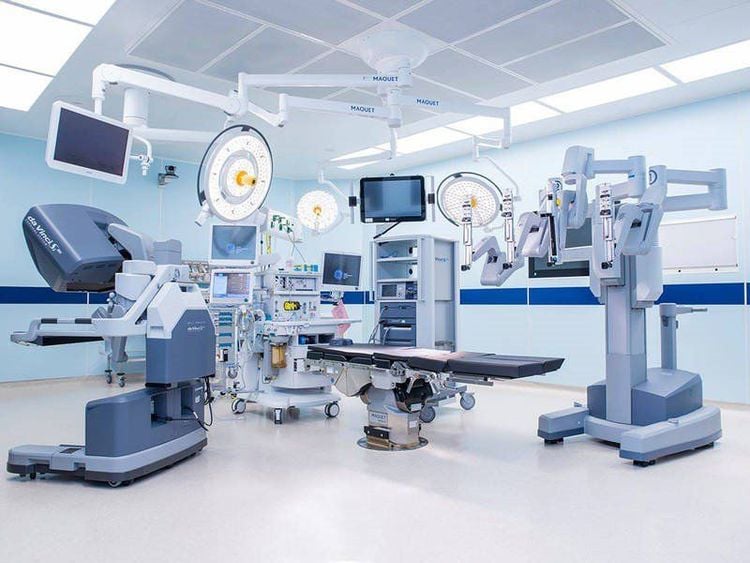
Bệnh viện Vinmec có các trang thiết bị phẫu thuật hiện đại
6. Caring for patients after surgery
Maintain good hand hygiene and eye hygiene. Take medication as prescribed by your doctor. Common common manifestations: Mild redness, mild irritation, slight swelling, watery eyes,... However, this feeling will pass in a few days after surgery.When the following symptoms appear, the patient needs to go back to the hospital immediately:
Pain. Fast blurred vision. Red eyes a lot. Seeing flashes of light or lots of flies flying in front of your eyes. Patients need to adhere to the following:
Use the correct medicine as ordered by the doctor. Before applying the medicine, you need to wash your hands. Liquids should be instilled 5 minutes apart and ointment should be applied last. After instillation, the lid should be closed immediately to prevent contamination of the vial. For the first few days after surgery, avoid getting soap in your eyes, so don't wash your hair. Patients can bathe under their neck after a day, full body shower or bath after a few weeks. No swimming for 1 month. Patients can eat soft food, should not eat too hard, avoid chewing hard and hard. Absolutely do not rub or scratch your eyes. Need to wear an eye patch or use eye protection to avoid rubbing your eyes unconsciously during sleep. The patient should not carry heavy loads or bow a lot. You can watch TV as usual. Patients can return to work as usual after a month.
7. What is special about Phaco surgery at Vinmec Times City?
7.1. About the team of experienced experts Vinmec gathers a team of experts, leading ophthalmologists, with extensive experience in the field of surgery:
Phaco surgery, corneal transplant: Assoc. BS. Hoang Thi Minh Chau Glaucoma surgery and treatment : Assoc. BS. Dao Thi Lam Huong Surgery and treatment of lacrimal diseases: Assoc. BS. Pham Thi Khanh Van 7.2. About equipment and consumables Along with advanced and modern equipment and machinery, Phaco cataract surgery process is most effective. Vinmec Times City uses the most modern Phaco surgical machine, Centurion, with many outstanding advantages such as:
High safety. Effective multiplication. Good energy balance. Small incision < 2.2 mm, no stitches, no bleeding, no pain, minimizing the possibility of astigmatism and postoperative complications, helping vision recover quickly. current highest. Vinmec Times City International Hospital is also the first hospital in Vietnam to provide boxes and cards to ensure information and quality of artificial lenses for customers. This artificial lens has the following advantages: Has good adhesion, thus minimizing displacement in the eye. Specially designed to minimize the incidence of secondary posterior capsular opacities. Having stability in the capsule provides the best possible vision. Has the ability to filter harmful rays to the retina, causing macular degeneration such as blue light, UV rays. 100% new surgical consumables, only used once, thus ensuring high safety in surgery. Meets stringent JCI safety standards. Customers can go directly to Vinmec Times City to visit or contact hotline 0243 9743 556 for support.






